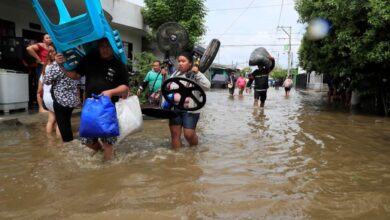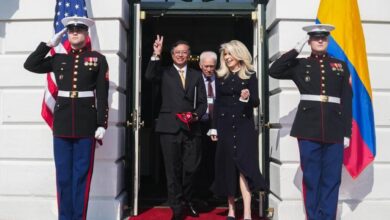Who are the Carbon Cowboys and what is their influence in the Amazon?
Carbon bonds have various moral questions. An industry of them has been generated that has put multiple communities worldwide in unequal negotiations. We tell you about these businesses on Amazon.

Photo: carboncowboys.org
LatinAmerican Post | Daniel Alejandro Vergara
Listen to this article
Leer en español: ¿Quiénes son los Carbon Cowboys y cuál es su influencia en la Amazonía?
After the implementation of the Kyoto protocols in 1997, carbon credits were created, as a way of preserving forests in exchange for allowing large industries to continue generating emissions. With the appearance of this new model of environmental protection, the Carbon Cowboys have appeared, private actors who mediate and negotiate carbon credits between the industries and communities of the Amazon.
To understand the whole panorama, it is necessary to define what carbon bonds are. This is one of the three international mechanisms proposed in the Kyoto Protocol, essentially seeking that countries and companies that emit greenhouse gases (GHG), compensate for environmental damage, investing in the preservation and protection of the world's forests, which It has the ability to absorb CO2 and convert it into oxygen.
Although this mechanism has been established since 1997, currently various governments and communities continue to have problems adjusting the environmental legal framework of each country and regulating the purchase and sale of these bonds. Now, one of the main problems that this new market has to face is the appearance of the so-called Carbon Cowboys, private companies that function as intermediaries between the industries that emit GHG and the communities (peasant, Afro, and indigenous) that are in the jungle and they are the ones who are going to guarantee the protection of these ecosystems.
It is no secret that one of the factors that have prevented large-scale deforestation in the Amazon is the presence of indigenous communities, which have protected the jungle and forests for millennia, since they have a close relationship, vital and spiritual, with the territory. That is why the "new market" for carbon bonds is so striking, companies pay to take care of ecosystems and thus these communities receive money that can help meet the needs they have historically had to face because of state neglect, armed conflicts, and social injustice.
Although in the 9 countries where the Amazon is located there are problems with the Carbon Cowboys, specifically in Colombia this problem has been increasing in recent years. Various environmental organizations, NGOs, and communities have exposed that some private companies contacted leaders of indigenous reservations offering them agreements to allow them to sell carbon credits for periods of 10, 20, and even 100 years.
We suggest you read: From "Backyard" To "Garbage Dump": This Is How The US Is Using Latin America As Its Landfill
According to an investigation carried out by the Latin American Center for Journalistic Investigation (CLIP), La Liga Contra el Silencio, Mongabay Latam and Rutas del Conflicto: “In mid-2019, the Nukak indigenous community (near San José del Guaviare) accepted the invitation of Waldrettung, a Colombian company – which claimed to be a subsidiary of a German company – that had approached one of its leaders to propose a business: sell carbon credits, a financial solution to the climate crisis with which they could receive economic payments for the care of the tropical humid forest within its nearby shelter. However, many indigenous people did not understand what the business that the emissaries of the company Waldrettung SAS were about, they met with them in the spa near San José. According to three leaders of the indigenous community, in the midst of the food and liquor that they were offered that day, the Nukak signed a contract proposal that was brought to them by an intermediary company that represented Waldrettung and through which the indigenous committed themselves to develop jointly a project of carbon bonds for 100 years”.
The same investigation states that the Waldrettung company never signed the contract and the deal was not carried out. However, this is just one example of what is being done with the communities, the Carbon Cowboys are contacting the safeguards directly and making them sign contracts without explaining in depth what they are committing to and what their profits will be. This "modus operandi" violates the law, Resolution 1447 of 2018 of the Ministry of the Environment gives this entity the ability to request information on carbon bond projects, visit them and carry out investigations.
“It is an unequal market. Today the towns are feeling the effects. The bonds are selling for millions of dollars; companies are offsetting taxes with carbon credits, but the indigenous peoples —the base of the business— are not benefiting. Indigenous peoples are dealing with these types of contracts. He explains that they usually seek advice when they have already signed a contract, of which in many cases they do not have a copy; these contracts –sometimes written in other languages– have confidentiality clauses that establish sanctions if the information is leaked; they also have dispute resolution clauses in arbitration courts of other countries and, in addition, there is a lot of ignorance about the business, ”said Juan Camilo Morales, legal advisor to the National Organization of Indigenous Peoples of the Colombian Amazon (OPIAC) to the portal Mutant website.
Finally, Carbon Market Watch, a European non-profit organization, has launched an alert about irregularities in the carbon bond market in Colombia, since bonds may be being sold without prior legal studies that indicate the capacity of a territory to absorb GHG. Likewise, it calls for better regulation by the State not only in the law of this environmental mechanism but also in the legal advice needed by the communities that are subsequently monopolized by the unequal offers that the Carbon Cowboys make in their territories.
There are many legal, technical and technological loopholes that prevent the correct implementation of a fair market for carbon credits in Latin America, however, with the current situation, governments are expected to take measures on this problem not only to protect the environment but also to the native communities.




